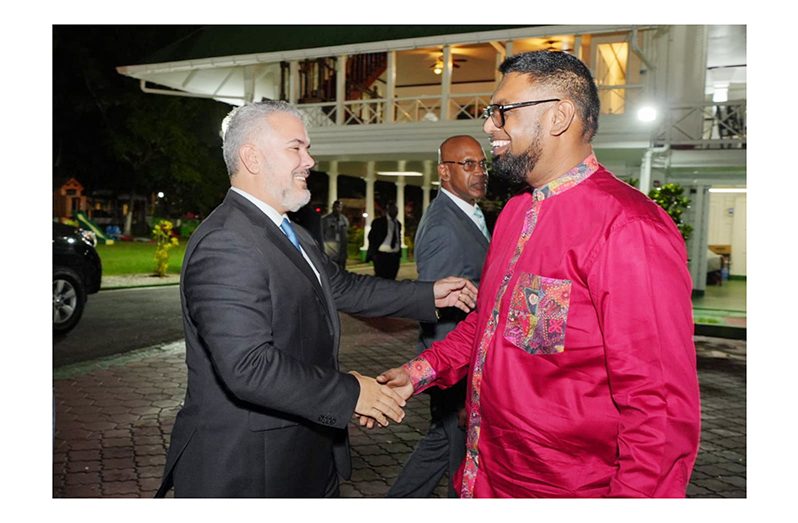–Former Colombian President acknowledges; confident that country’s leadership will continue to pursue a rapid pace of transformation, address social issues effectively
–points to potential for massive gains in the areas of energy, the environment, food security
FORMER Colombian President, Ivan Duque, has highlighted Guyana’s potential as a burgeoning superpower in energy, environment, and economic transformation.
In outlining the nation’s potential, Duque also commended President, Dr Irfaan Ali for his leadership, and efforts towards developing solutions to local, regional and global issues.
In an exclusive interview with Arick Wierson for Newsweek Magazine, the former Colombian President expressed optimism about Guyana’s trajectory under President Ali’s stewardship.
He said, too, that with concerted efforts and international support, Guyana has the potential to realise its vision of a prosperous and sustainable future for all its citizens.
Duque highlighted President Ali’s proactive approach towards addressing social and economic challenges, stating: “President Ali is working on a development agenda that can provide long-awaited social solutions for the people of Guyana.”
He acknowledged the challenges of accelerating the pace of transformation, but noted President Ali’s commitment to intensifying these efforts day by day.
Highlighting Guyana’s unique position, Duque outlined its potential to emerge as a regional powerhouse, particularly in the realms of energy and environment.
With vast biodiversity and burgeoning oil and gas reserves, Guyana stands poised to become a significant player in the Caribbean region.
“Guyana today is a country that is a superpower in terms of biodiversity and is on track to become a superpower in oil and gas,” Duque remarked.
He underscored Guyana’s pivotal role in addressing food security concerns in the Caribbean, and highlighted that with its expansive territory and favourable energy prices, Guyana has the capacity to emerge as a leading provider of food for neighbouring nations.
“Regionally speaking, it is a territory of more than 200,000 square kilometres [and] with good energy prices and good logistics can be one of the main providers of food for the whole Caribbean nations. So, it can be one of the solvers of food security concerns in the Caribbean.
“If you put that in the context of a country with literally no deforestation, with a great environmental vision, I think you will see a lot of energy, environment, social and economic transformation,” the former president said.
Duque reaffirmed the importance of supporting Guyana in achieving these transformative goals “as soon as possible”.
Guyana’s commitment to environmental conservation also earned praise from Duque.
With approximately 85 per cent of its territory covered in tropical forests and minimal deforestation, Guyana sets a commendable example for sustainable development.
“Guyana today, it’s a country that as I said is a leader in conservation. I mean, imagine 85 per cent of the territory in tropical forest, an Amazon country with almost zero deforestation, almost 14 per cent of the territory in the hands of indigenous groups with legal titling, and having the possibility to be protectors of that environment. I think those are very important indicators,” he said.
Duque also lauded Guyana’s low carbon development strategy, in place for over a decade, as a testament to its environmental stewardship. He also highlighted Guyana’s strategic investments in renewable energy sources, such as solar and wind, as part of its transition away from heavy oil dependency.
He commended Guyana’s utilisation of oil and gas revenues to invest in education, healthcare, housing, and human development, emphasising the importance of inclusive growth.
Addressing the issue of income inequality, Duque also praised Guyana’s efforts to implement a universal income system, providing support to vulnerable families while simultaneously expanding investments in human development.
SUSTAINABLE ECONOMIC TRANSFORMATION
He expressed confidence in Guyana’s ability to leverage its newfound prosperity for the collective benefit of its citizens, fostering sustainable economic transformation.
The international community has long praised Guyana for its dedication to environmental sustainability and leadership in addressing climate change.
Recently, Ambassador Linda Thomas-Greenfield, the US envoy to the United Nations, acknowledged President Ali’s dedication to environmental priorities, particularly supporting rural communities and maintaining forest cover.
Meanwhile, the World Bank’s Vice-President for the Latin America and Caribbean Region, Carlos Felipe Jaramillo, has said that the international financial institution is interested in the good learning practices that Guyana has to offer in its efforts to combat the effects of climate change.
Guyana’s commitment is evident in the initiatives to combat climate change and enhance economic resilience within the Caribbean Community (CARICOM), as it contributed US$2 million to the Regional Adaptation Fund.
Guyana also makes strides in biodiversity conservation by setting up a state-of-the-art biodiversity centre, as part of its Low Carbon Development Strategy (LCDS) 2030. This strategy aims to balance economic growth with environmental preservation.
Guyana’s historic $1.146 trillion 2024 budget, is also set to transform the country’s economic landscape.
Major projects such as the gas-to-energy initiative and the Amaila Falls Hydro Project are underway, aiming to provide affordable, reliable energy while reducing reliance on fossil fuels.
Some of the other alternative energy sources that Guyana is investing in include biomass and bagasse-based cogeneration, rice husk, biodiesel, ethanol and wind.
Those investments align with Guyana’s goal to transition to renewable energy sources and reduce its greenhouse gas emissions.
The country aims to achieve a 75 per cent renewable energy consumption by 2030, as outlined in the LCDS.
Additionally, the country is making significant progress in renewable energy, with a focus on solar projects expected to provide power to nearly 90 per cent of the hinterland population by 2025. These efforts align with global sustainability goals and support inclusive growth and energy access.
The government is also taking regional leadership through initiatives such as the ‘25 by 25’ plan, aimed at reducing CARICOM’s food-import bill by 25 per cent by 2025 and creating innovative financing models for environmental sustainability, such as the landmark agreement with Hess Corporation for the purchase of 2.5 million carbon credits annually.
Economic forecasts for Guyana are exceptionally positive, with the World Bank predicting unparalleled growth rates in the coming years, driven by oil production and the diversification of sectors such as agriculture and construction.
The forecast predicts an astounding 38.2 per cent growth in 2024 and 15.2 per cent in 2025 for Guyana, the highest in the Caribbean. Overall, the country’s economic landscape is set for continued expansion, with growth averaging 20 per cent annually from 2024 to 2028.
This growth is supported by an ambitious budget focused on development, infrastructure, and social welfare, without new taxes. However, the spectre of climate change and environmental degradation looms large.
Guyana is addressing these challenges head-on, with comprehensive strategies for low-carbon development and significant investments in renewable energy projects, including solar, hydropower, and wind initiatives.
The country’s transition to cleaner energy sources is also reflected in the development of infrastructure such as the Corentyne River Bridge, enhancing connectivity and trade potential.
In preparation for the future, Guyana is enhancing its safety and environmental protection measures, particularly in the oil sector, with a National Oil Spill Response Plan and regular training exercises.
This proactive stance ensures that while the country harnesses its natural resources for economic gain, it remains vigilant against potential environmental risks.


.jpg)











